Ruby Dhalla and Ontario politics .. Ontario Budget 2009 .. rise of Andrea Horwath .. sad fate of John Tory
May 8th, 2009 | By Randall White | Category: Canadian Provinces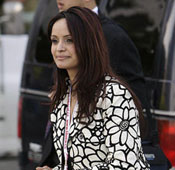 UPDATED MAY 11, MAY 12. Ontario residents, it is often said, are Canadians first. And nothing illustrates the sometimes bizarre linkages between federal and provincial politics in Canada’s most populous province quite so bizarrely as the demand for the resignation of Ontario provincial Liberal labour minister Peter Fonseca, over his failure to aggressively investigate alleged complaints against Ontario federal Liberal MP Ruby Dhalla, from two nannies (and now one other former domestic employee), in a Brampton, Ontario house used mostly by her mother and brother!
UPDATED MAY 11, MAY 12. Ontario residents, it is often said, are Canadians first. And nothing illustrates the sometimes bizarre linkages between federal and provincial politics in Canada’s most populous province quite so bizarrely as the demand for the resignation of Ontario provincial Liberal labour minister Peter Fonseca, over his failure to aggressively investigate alleged complaints against Ontario federal Liberal MP Ruby Dhalla, from two nannies (and now one other former domestic employee), in a Brampton, Ontario house used mostly by her mother and brother!
Even as an issue in federal politics no less Liberal-partisan an Ottawa pundit than Don Martin of the National Post, Calgary Herald, etc, etc has written: “Something doesn’t smell right in having two former nannies step forward a year after they left the Dhalla family’s employment to suddenly complain about conditions that don’t seem unusually onerous. ” And now the estimable Queen’s Park commentator Jim Coyle from the Toronto Star, which broke the story in the first place, is saying: “It’s doubtful that many think Fonseca should resign over this. Ontarians don’t expect their politicians to be perfect … ” If the deepest truth is known, you start to think, this just may be what always happens when you are Canada’s first MP Beauty Queen, and the third hottest politician in the world.
MAY 11 UPDATE [AND THE COMPARATIVE POLITICS OF MARA CARFAGNA IN ITALY, HOTTEST POLITICIAN IN THE WORLD]
1. Premier Dalton McGuinty has now indicated that his labour minister, Peter Fonseca, has agreed to appear before the [federal] parliamentary committee investigating the allegations against Ruby Dhalla, by two of her mother’s former foreign-trained caregivers (and one housekeeper). The Premier also continues to defend Fonseca amid opposition demands that the labour minister resign for failing to investigate the complaints.
2. Meanwhile, it has been reported that federal Conservative Immigration Minister Jason Kenney attended at a meeting last month with one of the advocates for three immigrant caregivers who say they were mistreated by the family of Liberal MP Ruby Dhalla … But Mr. Kenney scoffs at Ms. Dhalla’s suggestion that her current problems are part of a conspiracy to discredit her as a politician. (For more on Ms. Dhalla’s suggestion see: “Political conspiracy fuelling nanny scandal, Dhalla says” ; “Ruby Dhalla says she’s the victim” ; “Lawyer: Dhalla target of smear campaign” ; and “Liberal MP Dhalla defends herself.” And note Don Martin’s comments below!)
 3. Meanwhile again, the irrepressible (and still fundamentally right-wing conservative) Toronto Sun has been reporting “More trouble for Ruby … Producer claims romantic scenes cut from film …Â Six years after making a Bollywood-style movie with now-MP Ruby Dhalla, producer and co-star Charanjit Chico’ Sihra saw his first publicly-available DVD copy yesterday [May 10]Â … But after viewing the feature filmed in Hamilton and Toronto in 2003 for $200,000, the Hamilton auto body shop owner and aspiring film-maker said he’s angry a controversial scene was removed … As reported in the Sun yesterday [May 10], Sihra was tipped from India about the cut fantasy sequence in which they snuggle and sing while fully clothed … His source told him someone from Canada paid a lot of money to have it taken out.'”
3. Meanwhile again, the irrepressible (and still fundamentally right-wing conservative) Toronto Sun has been reporting “More trouble for Ruby … Producer claims romantic scenes cut from film …Â Six years after making a Bollywood-style movie with now-MP Ruby Dhalla, producer and co-star Charanjit Chico’ Sihra saw his first publicly-available DVD copy yesterday [May 10]Â … But after viewing the feature filmed in Hamilton and Toronto in 2003 for $200,000, the Hamilton auto body shop owner and aspiring film-maker said he’s angry a controversial scene was removed … As reported in the Sun yesterday [May 10], Sihra was tipped from India about the cut fantasy sequence in which they snuggle and sing while fully clothed … His source told him someone from Canada paid a lot of money to have it taken out.'”
4. Stories like this last one no doubt have a lot to do with veteran Ottawa reporter Susan Delacourt’s speculation in this past Saturday’s Toronto Star:Â “End of Dhalla’s political career? … Controversies taken together have become a narrative that could be difficult to shake … Dhalla’s troubles, unfortunately for her, have drifted into a kind of narrative about her character. There was the incident in which an aide’s purse was stolen in India, the child thieves were beaten by the police, and Dhalla seemed to be insensitive. Then there was the story in March, about Dhalla trying to block the release of a Bollywood DVD in which she starred before becoming an MP. And now there’s this latest blow-up … The controversies, taken together, paint an unflattering picture of haughtiness, even arrogance. Even if it’s a wildly false picture – her friends and supporters say it’s totally off the mark – a narrative, once established, is hard to shake.”
5. Ms. Delacourt notwithstanding, Ms. Dhalla’s enemies in Ottawa have yet to make any thoroughly compelling case. What may seem like haughtiness and arrogance inside the capital-city bubble just seems like someone doing unusually interesting things that make Ottawa look almost half-human to many of us in other parts of the country. And the new fact that Jason Kenney actually did attend a meeting last month with an advocate for Ms. Dhalla’s caregiver critics does lend some fuel to Don Martin’s speculation of last week: “Perhaps I’m being excessively suspicious, but a Conservative hit squad has taken aim at Dhalla for more than a year … The Conservatives dearly want Dhalla to lose her seat in the next election – and procuring this sort of scandal is perfect takedown material.”
 6. The ongoing story can also prompt some vaguely deeper digging into Maxim magazine‘s ranking of Ms. Dhalla as third-hottest politician in the world (last year).
6. The ongoing story can also prompt some vaguely deeper digging into Maxim magazine‘s ranking of Ms. Dhalla as third-hottest politician in the world (last year).
As noted below, the second-hottest ranking went to Sarah Palin from the USA. I must shamefully confess, however, that Maxim magazine’s absolute or first hottest politician, Mara Carfagna from Italy, was not someone I knew of at all. The magic of the Internet has now changed that. And I can only report that while there do seem a few intriguing similarities between the stories of Mara Carfagna and Ruby Dhalla, judged by the standards of Ms. Carfagna Ms. Dhalla, in a suitably Canadian style, comes close to some kind of minor saint. (For more on Mara Carfagna, see: Mara Carfagna [the Wikipedia entry] ; “Former showgirl Mara Carfagna comes under fire for anti-prostitution law” ; “Italy prime minister Silvio Berlusconi headed for divorce” ; “Berlusconi and his new golden girl are laid bare” ; and [to see why she probably really is the hottest politician in the world today, with your own eyes] “Calendario Mara Carfagna foto.”)
The one decisive respect in which both Mara Carfagna and Ruby Dhalla do seem to have something in common is suggested in an online article entitled “Mara Carfagna is Sexy Model Turned Italian Cabinet Minister” by a Beth Shaw:Â “People just can’t stand it when a beautiful, super hot woman is successful. They have to bring her down. Such is the problem that Italy’s equal opportunity minister is having.” And something of the same problem, it seems, is currently facing the former official opposition critic for multiculturalism and youth in Canada as well.
MAY 12 UPDATE: APPEARANCES BEFORE THE STANDING COMMITTEE ON IMMIGRATION IN OTTAWA
This morning the two caregivers Magdalene Gordo, 31, and Richelyn Tongson, 37, appeared before the Canadian House of Commons Standing Committee on Immigration in Ottawa, via video conference from Toronto.
According to the CBC website, they testified that Liberal MP Ruby Dhalla hired them to care for her mother, expected them to work long hours and demanded they surrender their passports to her … The testimony … flies in the face of Dhalla’s statement last week that she had nothing to do with the women’s employment and that she was rarely home when they worked.
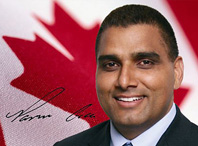 The clips of this testimony that Don Newman has shown on CBC Newsworld, around 11 AM, seemed to me to present a somewhat different picture. The two women appear very concerned about the prospect of having to go back to the Philippines, where life is apparently very difficult for them. And this is what they became most spontaneously emotional about. Their testimony regarding Ms. Dhalla, on the other hand – or again what I saw of it on Don Newman’s Newsworld clips – struck me as rather studied and mechanical – and not altogether inconsistent with Ms. Dhalla’s own story.
The clips of this testimony that Don Newman has shown on CBC Newsworld, around 11 AM, seemed to me to present a somewhat different picture. The two women appear very concerned about the prospect of having to go back to the Philippines, where life is apparently very difficult for them. And this is what they became most spontaneously emotional about. Their testimony regarding Ms. Dhalla, on the other hand – or again what I saw of it on Don Newman’s Newsworld clips – struck me as rather studied and mechanical – and not altogether inconsistent with Ms. Dhalla’s own story.
Ms. Dhalla herself appeared before the committee this morning as well. I caught only the later part of her testimony. But she seemed to be surviving more than well enough. She no doubt has something of the arrogance that many ambitious (and hard-working, to say nothing of physically attractive) people project. And her mother, who it would seem has also worked hard to get where she is in Canada today, may not think there is anything particularly wrong about expecting people she employs herself to work hard for her. But has Ruby Dhalla done anything patently and maliciously illegal (in a context where exactly what is and is not illegal seems rather murky in the first place)? Has the Dhalla family (the mother of which is of course an immigrant in her own right) treated foreign workers in any plainly disreputable or appalling way? And are the Conservatives and/or other opposition parties somehow systematically plotting against Ms. Dhalla for partisan political purposes? As best as I can make out, the answers to all three of these questions remain at best unclear. And Ruby Dhalla may well come out of all this looking rather better than her very aggressive Conservative rival for her Brampton-Springdale seat, Parm Gill. One way or another, time will tell. (And meanwhile, none of this seems to be doing anyone all that much good – and perhaps least of all the Canadian people, who are paying the bills.)
EARLIER REPORT :Â MAY 8
The issue right now … a quick and dirty summary …
 The salient facts – as matters stand at least – seem to be as follows: This past March 14, the Toronto Star began reporting on a public interest Star investigation into Nannies trapped in bogus jobs … Lured by the promise of a better life, hundreds of foreign-trained nannies have found themselves working illegally in menial jobs, without their passports and owing thousands to job agencies.
The salient facts – as matters stand at least – seem to be as follows: This past March 14, the Toronto Star began reporting on a public interest Star investigation into Nannies trapped in bogus jobs … Lured by the promise of a better life, hundreds of foreign-trained nannies have found themselves working illegally in menial jobs, without their passports and owing thousands to job agencies.
(It may or may not be worth noting that just before this reporting began, there were vaguely salacious stories in the media about the appearance of Ruby Dhalla, Liberal MP for the Greater Toronto Area riding of Brampton-Springdale, in a 2003 Bollywood movie, that she had made [in Hamilton, Ontario] before she entered Canadian federal politics. Ms. Dhalla, it perhaps should be clarified as well, is the first female Sikh MP in Canadian federal politics: She was born [in 1974] in Winnipeg, Manitoba, to an immigrant family from Punjab, India.)
Then, around the middle of this past April, allegations that Ruby Dhalla MP had been abusing foreign-trained nannies surfaced … at a public meeting where nannies told two Ontario cabinet ministers that placement agencies and employers are using the federal Live-In Caregiver Program to keep them enslaved … The meeting was held by provincial Education Minister Kathleen Wynne and Labour Minister Peter Fonseca after a Star investigation exposed widespread abuse in a program that allows Canadians to hire foreign caregivers to look after children, the elderly or people with disabilities.
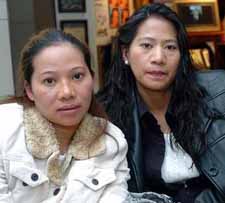 At this April 2009 public meeting one Magdalene Gordo, 31 “stood up and accused Dhalla, MP for Brampton-Springdale, of holding her passport and refusing to pay her when she quit … Seeing (Wynne) up there asking us to be strong and stand up for our rights, I had a flash of what happened to me [back in early 2008 in fact] and I decided to speak out,’ said Gordo, adding she admitted to the politicians she worked illegally’ at the Dhalla household without a work permit … The Star learned of the allegations and began its own probe.”
At this April 2009 public meeting one Magdalene Gordo, 31 “stood up and accused Dhalla, MP for Brampton-Springdale, of holding her passport and refusing to pay her when she quit … Seeing (Wynne) up there asking us to be strong and stand up for our rights, I had a flash of what happened to me [back in early 2008 in fact] and I decided to speak out,’ said Gordo, adding she admitted to the politicians she worked illegally’ at the Dhalla household without a work permit … The Star learned of the allegations and began its own probe.”
Further investigation soon revealed that a second nanny, Richelyn Tongson, 37, had been hired to help look after Ruby Dhalla’s mother, Tavinder Dhalla (who, according to her son, Neil, has a disability which makes it difficult for her to walk and stand for long periods). Ms. Tongson complained that Tavinder Dhalla also had her wash the family’s three cars on several occasions and perform heavy-duty outside work that left her hands numb … Tongson said she was interviewed and hired by Ruby Dhalla on Feb. 22, 2008, the same day Gordo said she quit.
As further revealed by the Star: Both nannies say Tavinder [ie Ruby Dhalla’s mother] appeared quite healthy, but had a foot problem that required massaging late in the evening. They claimed that, beyond providing morning and nightly tea for Tavinder, most jobs were cleaning-related, either in the house, outside or in chiropractic clinics owned by the family … Nanny advocates say these jobs fall outside the federal guidelines for caregivers hired under the program. Her mother had me shovelling snow at midnight,’ said Gordo. She wanted a slave, not a caregiver.’
 Finally, just after Ruby Dhalla had resigned her position as opposition critic for multiculturalism and youth (but not her job as an MP) – pending an investigation to clear her name (as she sees things at any rate): A third foreign worker … hired by Ruby Dhalla’s family … stepped forward … Lyle Alvarez, 32, says the MP for Brampton-Springdale promised she would try to help her stay in Canada as a live-in caregiver if she passed a tryout as a housekeeper at the family’s Mississauga home.
Finally, just after Ruby Dhalla had resigned her position as opposition critic for multiculturalism and youth (but not her job as an MP) – pending an investigation to clear her name (as she sees things at any rate): A third foreign worker … hired by Ruby Dhalla’s family … stepped forward … Lyle Alvarez, 32, says the MP for Brampton-Springdale promised she would try to help her stay in Canada as a live-in caregiver if she passed a tryout as a housekeeper at the family’s Mississauga home.
As Ms. Alvarez tells the story now, things did not work out so well for her (even if she did get her picture taken with Ms. Dhalla): The tryout turned out to be long hours on her knees scrubbing and cleaning floors, hand washing and ironing clothes. Even worse, I had to polish their shoes … for Miss Ruby and her brother,’ Alvarez said in an interview from western Canada, where she is now living and working. She has a lot of shoes, downstairs and upstairs’ … Alvarez said she never worked less than 12-hour days, and was paid under the table’ for the nine days she worked there. She described … Dhalla’s mother, Tavinder, as a hard-driving taskmaster. (It seems worth noting as well, however, that Ruby Dhalla has her own house in Brampton, and spends most of her week nowadays in Ottawa. Why she would have quite so many shoes at her mother’s house, upstairs and downstairs, is unclear.)
What is to be done at Queen’s Park?
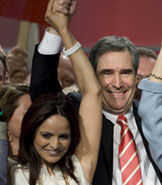 As matters stand, at the federal level of Canadian government in Ottawa (and Ms. Dhalla is, again, a federal MP and not a member of the Ontario provincial legislature), the first two nanny complainants Gordo and Tongson have been invited [or are about to be, according to some reports] to appear before the Standing committee on Immigration … on Tuesday [May 12, also an important day for elections in both the Canadian province of British Columbia, and the mother country of Ms. Dhalla’s parents, India] to give evidence of their dealings with Dhalla..
As matters stand, at the federal level of Canadian government in Ottawa (and Ms. Dhalla is, again, a federal MP and not a member of the Ontario provincial legislature), the first two nanny complainants Gordo and Tongson have been invited [or are about to be, according to some reports] to appear before the Standing committee on Immigration … on Tuesday [May 12, also an important day for elections in both the Canadian province of British Columbia, and the mother country of Ms. Dhalla’s parents, India] to give evidence of their dealings with Dhalla..
Not surprisingly, more than a few members of the federal Conservative, New Democrat, and Bloc Quebecois parties, who all have their good enough reasons for fearing Michael Ignatieff’s new-look Liberals at the moment, are falling all over themselves to make as much political hay as they can out of Ruby Dhalla’s current embarrassment. She is a Liberal rising star, and if she can be somehow shot down, all Liberal opponents can reasonably be imagined to benefit.
 But, you may well ask, what does all this really have to do with Ontario provincial politics, headquartered in the fabled pink palace at Queen’s Park in Toronto (well, at least somewhat pink these days, architecturally as well as politically)? According to the august pages of the Toronto Globe and Mail: Commons committee asks Dhalla nannies to testify … Tory-led immigration panel wants to hear from Filipino immigrants who have found other employment since leaving the Liberal MP’s home … Meanwhile, at the Ontario Legislature, Premier Dalton McGuinty said he learned only on Wednesday [May 6] – about the same time as the public – that one of his cabinet ministers was swept up in the controversy.
But, you may well ask, what does all this really have to do with Ontario provincial politics, headquartered in the fabled pink palace at Queen’s Park in Toronto (well, at least somewhat pink these days, architecturally as well as politically)? According to the august pages of the Toronto Globe and Mail: Commons committee asks Dhalla nannies to testify … Tory-led immigration panel wants to hear from Filipino immigrants who have found other employment since leaving the Liberal MP’s home … Meanwhile, at the Ontario Legislature, Premier Dalton McGuinty said he learned only on Wednesday [May 6] – about the same time as the public – that one of his cabinet ministers was swept up in the controversy.
The Globe and Mail goes on: Staff in the Premier’s office contacted officials in [labour minister] Mr. Fonseca’s office on Tuesday [May 5], the day the allegations were published in the Toronto Star. But it was not until the next day, after the topic dominated Question Period during the Premier’s absence, that he was told about the provincial angle’ to the story, a spokeswoman in his office confirmed … I was briefed by my communications folks,’ Mr. McGuinty told reporters yesterday … Both the Progressive Conservatives and New Democrats called yesterday for Mr. Fonseca’s resignation for failing to act on the allegations of mistreatment … Mr. McGuinty stood by Mr. Fonseca and told reporters he has no intention of asking him to resign. In fact, he said, Mr. Fonseca and Ms. Wynne went beyond the call of duty by playing host to the public meeting where about 30 live-in nannies, including Ms. Gordo first told her story.
 What labour minister Peter Fonseca and education minister Kathleen Wynne did at the public meeting was provide a 1-800 phone number that aggrieved nannies (including Ms. Gordo) could call with their complaints – which would presumably then be looked into (even if the number was not yet activated when ministers Fonseca and Wynne gave it out at the meeting of nannies). And: Fact sheets were provided on employment standards. It was apparently pointed out [as well] there was another level of government - the perfidious feds – that could be blamed. (In fact again, it is true enough that the Live-In Caregiver Program under which foreign-trained nannies such as Ms. Gordo are supposed to be employed is a program of the federal government, which is responsible for immigration.)
What labour minister Peter Fonseca and education minister Kathleen Wynne did at the public meeting was provide a 1-800 phone number that aggrieved nannies (including Ms. Gordo) could call with their complaints – which would presumably then be looked into (even if the number was not yet activated when ministers Fonseca and Wynne gave it out at the meeting of nannies). And: Fact sheets were provided on employment standards. It was apparently pointed out [as well] there was another level of government - the perfidious feds – that could be blamed. (In fact again, it is true enough that the Live-In Caregiver Program under which foreign-trained nannies such as Ms. Gordo are supposed to be employed is a program of the federal government, which is responsible for immigration.)
As explained by Jim Coyle at the Toronto Star: The [Conservative and New Democrat] opposition [at Queen’s Park], naturally, suspects the ministers were reluctant to pursue the alleged unpleasantness since it involved a federal Liberal cousin. Critics insist the matter should have been referred immediately by Fonseca to a deputy for investigation … His failure to do so suggests either callousness or incompetence, they said. Either way, they urged his resignation. Yet, as things stand right now in any case, an ordinary Ontario voter commenting on the issue on the website of the same newspaper seems to have grasped the essential heart of the matter more compellingly than the opposition politicians: Let’s be fair … The politicians at the meeting were intended to provide information. There were lots of accusations from the nannies, some may be true and some may not. As long as the politicians provided them where to file their complaints, they had done their job.
Meanwhile, back in Ottawa: will Ruby Dhalla finally be banished to a desert island somewhere this side of paradise?
 Toronto Star columnist Jim Coyle’s Friday, May 8 conclusion that it is doubtful that many [ordinary Ontarians] think Fonseca should resign over this would appear to signal a return to common sense over Ms. Dhalla’s alleged nanny scandal on the Ontario provincial front.
Toronto Star columnist Jim Coyle’s Friday, May 8 conclusion that it is doubtful that many [ordinary Ontarians] think Fonseca should resign over this would appear to signal a return to common sense over Ms. Dhalla’s alleged nanny scandal on the Ontario provincial front.
Of course, if complaints from foreign-trained nannies to the 1-800 phone number (which is presumably now in service) do finally suggest, after some serious investigation based on more than emotional complaints at a public meeting, that provincial labour laws are being broken, something will no doubt be done by Mr. Fonseca’s ministry. (And the Star has no doubt performed a laudable public service in raising this issue as well.)
But only an opposition politician with too much time on his or her hands could seriously argue that Mr. Fonseca resign from his cabinet post, because he had failed to act immediately and aggressively on the rather curious stories that all three of Ms. Alvarez, Ms. Gordo, and Ms. Tongson have told so far.
 What about Ruby Dhalla’s own standing in the Ottawa hothouse of Canadian federal politics – which is her own turf, and the focus of accountability for immigration and for the Live-In Caregiver Program at the bottom of what may or may not be all the real trouble involved?
What about Ruby Dhalla’s own standing in the Ottawa hothouse of Canadian federal politics – which is her own turf, and the focus of accountability for immigration and for the Live-In Caregiver Program at the bottom of what may or may not be all the real trouble involved?
Well, to start with, this afternoon (Friday, May 8) Ms. Dhalla and her lawyer, Howard Levitt, appeared at a press conference in Brampton, Ontario to come out swinging against ‘simply false’ nanny claims. The consensus among various Ottawa pundits on Don Newman’s CBC Newsworld TV show this afternoon was that Mr. Levitt was perhaps more aggressive in his presentation than he ought to have been for best effect. He did most of the talking. And when she did talk, Ruby Dhalla (understandably enough, many might say?) did not quite seem to be her usual charming self.
Yet the same pundits also seemed to concede that the press conference had presented evidence which cast some serious doubt on the stories told by Ms. Gordo and Ms. Tongson. And then there is Don Martin’s speculation in yesterday’s National Post: Perhaps I’m being excessively suspicious, but a Conservative hit squad has taken aim at Dhalla for more than a year and her opponent in the last and next election, Parm Gill, has his website up and is a regular tagalong with Immigration Minister Jason Kenney … The Conservatives dearly want Dhalla to lose her seat in the next election – and procuring this sort of scandal is perfect takedown material.
 And then there was Chris Selley in this past Wednesday’s National Post (and again no one can accuse this newspaper of Liberal sympathies): Yet another scandal for Ruby Dhalla … I think it’s safe to count Dhalla among the least controversial people the scandal-happy Canadian media have ever portrayed as a loose cannon at the end of a short fuse. In the meantime, as government MPs no doubt prepare their attack scenarios for the House of Commons, I suspect some of their colleagues are fastidiously reexamining their nannies’ documentation.
And then there was Chris Selley in this past Wednesday’s National Post (and again no one can accuse this newspaper of Liberal sympathies): Yet another scandal for Ruby Dhalla … I think it’s safe to count Dhalla among the least controversial people the scandal-happy Canadian media have ever portrayed as a loose cannon at the end of a short fuse. In the meantime, as government MPs no doubt prepare their attack scenarios for the House of Commons, I suspect some of their colleagues are fastidiously reexamining their nannies’ documentation.
I’m not quite ready to jump to any extreme conclusions myself. Except for this one. Ruby Dhalla is clearly an ambitious as well as a hard-working – and undeniably attractive – woman, who wants to get ahead in life. Her mother, notwithstanding her respect for other human beings, may even not be an easy woman to work for. But that’s hardly a sin even or especially in democratic politics. And I also think Ms. Dhalla has brought some distinction to Canadian federal politics (which doesn’t have all that much of such things nowadays).
 Not all that long ago, e.g., she was ranked 3rd … hottest politician in the world by something called Maxim magazine. No. 2 on the list, just ahead of Ruby Dhalla from Canada, was Sarah Palin from the United States. Forgetting political ideology altogether, if I had a choice between being stranded on a desert island just this side of paradise with Sarah Palin or Ruby Dhalla, there is not a shred of doubt in my mind who I would pick. And it wouldn’t be Sarah Palin!
Not all that long ago, e.g., she was ranked 3rd … hottest politician in the world by something called Maxim magazine. No. 2 on the list, just ahead of Ruby Dhalla from Canada, was Sarah Palin from the United States. Forgetting political ideology altogether, if I had a choice between being stranded on a desert island just this side of paradise with Sarah Palin or Ruby Dhalla, there is not a shred of doubt in my mind who I would pick. And it wouldn’t be Sarah Palin!
(On some parallel ground, no one will ever convince me that the Canadian people would be better off having the Sikh Parm Gill representing Brampton-Springdale in the Canadian House of Commons than the Sikh who is also Canada’s first MP Beauty Queen Ruby Dhalla. And finally, judging from their photographs, none of Ms. Alvarez, Ms. Gordo, and Ms. Tongson seem to have suffered in any altogether heinous ways over the past few years, at the hands of Ruby Dhalla, her mother or brother, or anyone else? Which is not to say that the federal Live-In Caregiver Program does not need to be somehow re-tooled, or even reformed.)
MARCH 30: RIDING MADLY OFF IN ALL DIRECTIONS .. ONTARIO BUDGET 2009
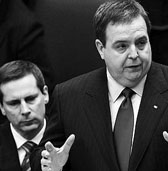 It fits certain sides of both Premier Dalton McGuinty and finance minister Dwight Duncan that the 2009 Ontario Budget bears some resemblance to the Stephen Leacock character Lord Ronald, who “flung himself upon his horse and rode madly off in all directions.” (And in case this sounds too much like the 19th century past of a place that was “once an outpost of a distant empire,” as the Budget Speech explains, the accompanying news release this year is also available in Arabic, Bengali, Chinese, Farsi, German, Greek, Hindi, Italian, Korean, Polish, Portuguese, Punjabi, Russian, Spanish, Tagalog, Tamil, Ukrainian, Urdu, and Vietnamese – along with English and French. If “the old engine of Canada’s economy” was “eclipsed by Alberta’s fossil fuel producers some time ago,” Ontario nonetheless remains an intriguingly dynamic most populous province.) Ontario Budget 2009, in any case, makes bold bows on the left, then drives straight up the centre, and finally concludes slightly to the right of Attila the Hun. To top everything off, it bribes the voters with their own money (as the opposition parties have complained), in a blatant display of Machiavellian democracy – the last installment of which is scheduled for just a few months before the next fixed-date provincial election. Of course, it may not work. But if it does, Premier McGuinty “might have written himself a place in Ontario history books.”
It fits certain sides of both Premier Dalton McGuinty and finance minister Dwight Duncan that the 2009 Ontario Budget bears some resemblance to the Stephen Leacock character Lord Ronald, who “flung himself upon his horse and rode madly off in all directions.” (And in case this sounds too much like the 19th century past of a place that was “once an outpost of a distant empire,” as the Budget Speech explains, the accompanying news release this year is also available in Arabic, Bengali, Chinese, Farsi, German, Greek, Hindi, Italian, Korean, Polish, Portuguese, Punjabi, Russian, Spanish, Tagalog, Tamil, Ukrainian, Urdu, and Vietnamese – along with English and French. If “the old engine of Canada’s economy” was “eclipsed by Alberta’s fossil fuel producers some time ago,” Ontario nonetheless remains an intriguingly dynamic most populous province.) Ontario Budget 2009, in any case, makes bold bows on the left, then drives straight up the centre, and finally concludes slightly to the right of Attila the Hun. To top everything off, it bribes the voters with their own money (as the opposition parties have complained), in a blatant display of Machiavellian democracy – the last installment of which is scheduled for just a few months before the next fixed-date provincial election. Of course, it may not work. But if it does, Premier McGuinty “might have written himself a place in Ontario history books.”
On the left …
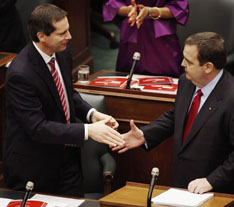 If you were overly impressed by the bold front-page headline in the Toronto Star for Saturday, March 28 (“McGuinty accused of betraying the poor“), you might guess that the Ontario Budget unveiled on March 26 has no left-wing credentials at all. But this headline flows from the premier’s “post-budget” speculation that “he may scrap next year’s scheduled hike in the minimum wage to $10.25 hourly because of the sagging economy … although a boost of 75 cents to $9.50 hourly will go ahead” – as promised in this past Thursday’s budget documents. (And in any case, the Toronto Star is now reporting: “I’ll keep minimum wage promise, McGuinty says.”)
If you were overly impressed by the bold front-page headline in the Toronto Star for Saturday, March 28 (“McGuinty accused of betraying the poor“), you might guess that the Ontario Budget unveiled on March 26 has no left-wing credentials at all. But this headline flows from the premier’s “post-budget” speculation that “he may scrap next year’s scheduled hike in the minimum wage to $10.25 hourly because of the sagging economy … although a boost of 75 cents to $9.50 hourly will go ahead” – as promised in this past Thursday’s budget documents. (And in any case, the Toronto Star is now reporting: “I’ll keep minimum wage promise, McGuinty says.”)
The Toronto Star‘s generally favourable March 27 budget editorial also welcomed “the accelerated increase in the child benefit payment, providing up to $1,100 per child to low-income families – while still worrying that “other fronts in the war on poverty have been short changed. There is no new money for child care, for example, and welfare benefits are being increased by a very modest 2 per cent. And the government chose not to ease the path to welfare for some needy families by ending the requirement that they first liquidate many of their assets.”
Yet, whatever else, the McGuinty regime at Queen’s Park remains a Liberal government. It came to office back in 2003 on a wave of growing dissatisfaction with the nasty neo-con plots of the former Mike Harris/Ernie Eves Conservative regime. And on its thickest bottom line the 2009 Budget Speech continues to talk a lot about “protecting public services.” In another grand old regional tradition, finance minister Dwight Duncan does urge that “building a powerful Ontario economy is our top priority.” But this is because: “Only a strong and growing economy will allow us to maintain and enhance our public services … create a green society,” and “yield a better quality of life for all of us.”
 Some might cite the promise that to “take advantage of Ontario’s emerging green economy, this Budget proposes more than $300 million in initiatives … to promote green economic development” as a further case in point. But $300 million is not very much in a total budget of almost $109 billion. The ultimate proof of the left-wing pudding here is the McGuinty government’s willingness to run some quite dramatic projected deficits over the next several years – in an effort to preserve “core program spending” (on health, education, and community and social services), despite “a significant deterioration in revenues,” as a result of the “global economic and financial storm” and its particular Ontario impact.
Some might cite the promise that to “take advantage of Ontario’s emerging green economy, this Budget proposes more than $300 million in initiatives … to promote green economic development” as a further case in point. But $300 million is not very much in a total budget of almost $109 billion. The ultimate proof of the left-wing pudding here is the McGuinty government’s willingness to run some quite dramatic projected deficits over the next several years – in an effort to preserve “core program spending” (on health, education, and community and social services), despite “a significant deterioration in revenues,” as a result of the “global economic and financial storm” and its particular Ontario impact.
Thus: “The 2009 Budget forecasts deficits of $3.9 billion in 2008-09 and $14.1 billion in 2009-10.” It also “lays out a plan to balance the budget by 2015-16 with the same prudent management that eliminated the $5.5 billion deficit that the government inherited in 2003.” But even assuming that the global storm does not prove any worse than the current Ministry of Finance projections imply, that means Ontario will be running deficits for the next six years.
Moreover, the $14.1 billion slated for the coming fiscal year 2009-10 is, in absolute numbers at least, the largest provincial deficit ever – although when you take inflation and the size of the current budget overall into account, the $14.1 billion is still lower than the Bob Rae NDP government’s rather more aggressively left-wing and highly controversial response to the early 1990s recession. Or, as the 2009 Budget Speech stresses: “The 200910 deficit-to-GDP ratio, deficit-to-revenue ratio and debt-to-GDP ratio are all below those of the United States now and Ontario in the 1990s. And we are in line with Canada today.”
Straight up the centre ….
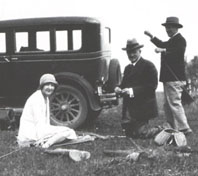 There may have been a time when “economic stimulus” spending by governments – in addition to “core program spending” on health, education, and community and social services (granting that this can be stimulative too, as President Obama is urging at the moment) – was seen as left-wing, at least in the spirit of the liberal English economist John Maynard Keynes.
There may have been a time when “economic stimulus” spending by governments – in addition to “core program spending” on health, education, and community and social services (granting that this can be stimulative too, as President Obama is urging at the moment) – was seen as left-wing, at least in the spirit of the liberal English economist John Maynard Keynes.
Nowadays, however, the global economic and financial storm has brought this approach to government fiscal policy back into the centre of the democratic political spectrum. Hardcore right-wing thinking may still not like the concept of economic stimulus spending on even “shovel-ready” infrastructure projects. But as Canada’s present Conservative federal minority government has shown, you have to be even more hardcore right-wing than Prime Minister Stephen Harper to pursue this thinking aggressively in the Great Recession of 2008????.
In the same spirit in the 2009 Ontario Budget “to confront the current economic challenge, our government has designed a stimulus package that creates jobs today and enhances Ontario’s future competitiveness … Today’s Budget commits $32.5 billion over the next two years for new infrastructure that will support more than 300,000 jobs.”
 Similarly, again: “This Budget increases training support for the unemployed right now.” Ontario is still concerned as well “that average federal benefits for unemployed Ontarians are more than $4,000 a year less than in other provinces” (a throwback to the days when the most populous province was still thought to be some kind of predatory “engine of Canada’s economy”). And: “Ontarians demand their fair share of Employment Insurance from the federal government so that the people of this province are treated the same as people right across Canada.”
Similarly, again: “This Budget increases training support for the unemployed right now.” Ontario is still concerned as well “that average federal benefits for unemployed Ontarians are more than $4,000 a year less than in other provinces” (a throwback to the days when the most populous province was still thought to be some kind of predatory “engine of Canada’s economy”). And: “Ontarians demand their fair share of Employment Insurance from the federal government so that the people of this province are treated the same as people right across Canada.”
Meanwhile: “we are taking immediate steps to help manufacturing and small business. For example, we are extending the writeoff for new machinery and equipment and providing a 100 per cent writeoff for new computers … This Budget also provides assistance to the agricultural sector and to northern communities, with investments to improve infrastructure, and supports the forest products and mining sectors with initiatives to help increase our exports.”
Finally, looking towards the future as well as the difficult economic challenges of the here and now, “innovation is the key to unlocking tomorrow’s jobs … To build research infrastructure, support life science research, green technologies applied research and genomics research, we will invest more than $700 million … We will also invest in our successful creative and entertainment sector, helping with tax credits and support for digital media … Ontario is open for innovation …”
Slightly to the right of Attila the Hun …
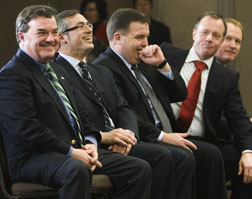 All this so far, you could say, fits well enough with the broad approach to public policy that the McGuinty government has been following since it was first elected in 2003. What is almost surprisingly different about the 2009 Ontario Budget (if not quite “transformational”?) is that it also includes a new right-wing emphasis on business-friendly tax and development programs. Or, as finance minister Duncan has urged: “Ontario is open for innovation and Ontario is also Open For Business.”
All this so far, you could say, fits well enough with the broad approach to public policy that the McGuinty government has been following since it was first elected in 2003. What is almost surprisingly different about the 2009 Ontario Budget (if not quite “transformational”?) is that it also includes a new right-wing emphasis on business-friendly tax and development programs. Or, as finance minister Duncan has urged: “Ontario is open for innovation and Ontario is also Open For Business.”
At the most radical end of this trend, last year just before Ontario budget time Jim Flaherty, a former Mike-Harris-era provincial Conservative minister of finance, and now federal minister of finance in Stephen Harper’s minority government, arrogantly urged the McGuinty government to reduce its corporate tax rate, and combine or “harmonize” the federal Goods and Services Tax and the provincial sales tax, as part of a fresh tilt towards the regional business community in economically challenging times.
 Premier McGuinty and finance minister Duncan said thanks but no thanks. Ontario did not need advice from Ottawa on such matters – and certainly not from Jim Flaherty. And at the time this seemed a good answer.
Premier McGuinty and finance minister Duncan said thanks but no thanks. Ontario did not need advice from Ottawa on such matters – and certainly not from Jim Flaherty. And at the time this seemed a good answer.
It may be a mark of just how much the economic challenges facing the province have increased since then that Ontario Budget 2009 finally takes the hint. (It is no doubt a sign of how things have changed in Ottawa as well, that Mr. Flaherty did not proffer any public advice to the Ontario budget process this year – but did quietly cough up an extra $4.3 billion of federal money over two years, to help harmonize the federal GST and provincial sales tax smoothly.)
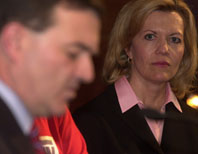 It may also be a mark of just how … well, peculiar? … both Ontario provincial and Canadian federal politics are right now, that this particular aspect of Ontario Budget 2009 has stirred up some federal-provincial family feuding, of a sort at any rate.
It may also be a mark of just how … well, peculiar? … both Ontario provincial and Canadian federal politics are right now, that this particular aspect of Ontario Budget 2009 has stirred up some federal-provincial family feuding, of a sort at any rate.
As reported by Karen Howlett and Steven Chase at the Globe and Mail: “The Ontario government’s plans to harmonize the provincial sales tax with the federal goods and services tax has led to an awkward split on the home front for federal Finance Minister Jim Flaherty and his wife, Christine Elliott, a provincial Progressive Conservative MPP and potential leadership candidate … Mr. Flaherty acknowledged in Montreal last night that his wife has come out against the harmonization plan, along with other members of the provincial Conservative caucus. But Mr. Flaherty couldn’t be happier that Ontario is moving to create a new 13-per-cent value-added tax. In fact, he is the one who has been pushing the province to do so ever since the Harper government came to office in 2006.”
 Meanwhile, back in the Budget Speech: “While our proposed single sales tax will do much to increase business productivity, we need to do much more … And we will … Mr. Speaker, small businesses are the backbone of this economy, so we propose an 18 per cent cut to the corporate tax rate for small businesses effective July 1, 2010 – taking the rate from 5.5 per cent to 4.5 per cent … We also plan to eliminate the small business surtax. This clawback is a barrier to growth. Ontario would be the only jurisdiction in Canada to end this barrier to growing businesses.
Meanwhile, back in the Budget Speech: “While our proposed single sales tax will do much to increase business productivity, we need to do much more … And we will … Mr. Speaker, small businesses are the backbone of this economy, so we propose an 18 per cent cut to the corporate tax rate for small businesses effective July 1, 2010 – taking the rate from 5.5 per cent to 4.5 per cent … We also plan to eliminate the small business surtax. This clawback is a barrier to growth. Ontario would be the only jurisdiction in Canada to end this barrier to growing businesses.
“We also propose to strengthen our businesses by reducing Ontario’s corporate income tax rate … Starting on July 1, 2010, Ontario’s general corporate income tax rate would be reduced to 12 per cent – a 14.3 per cent reduction. The general rate would be reduced to 10 per cent in 2013 – which is a further 16.7 per cent reduction … Ontario’s manufacturing and processing rate – which includes all manufacturers as well as forestry, farming, fishing and mining – would be reduced to 10 per cent starting July 1, 2010 – a 16.7 per cent cut in taxes … This unprecedented business tax reform will make Ontario businesses better able to compete and succeed in the global economy … Once fully implemented, the reform would cut Ontario’s tax rate on new business investment in half, making Ontario one of the most competitive jurisdictions in the industrialized world for new investment.”
Bribing the voters with their own money …
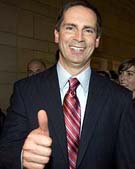 It may be worth wondering whether “making Ontario one of the most competitive jurisdictions in the industrialized world for new investment” is the kind of policy that has worked very well for some places over the past few decades (Ireland is one good example), but that may not work so well in the midst of the current “global economic and financial storm.”
It may be worth wondering whether “making Ontario one of the most competitive jurisdictions in the industrialized world for new investment” is the kind of policy that has worked very well for some places over the past few decades (Ireland is one good example), but that may not work so well in the midst of the current “global economic and financial storm.”
(Note such recent headlines, e.g., as “Irish economy shrinks at record pace in 2008,” “Ireland loses its triple ‘A’ rating,” “Restrictive budget would kill off Irish economy,” and “More Irish considering emigrating to Australia in economic downturn.”)
On the other hand, it is no doubt a plausible enough argument that in Ontario’s own current grim economic circumstances, anything with any chance of helping to generate “a strong and growing economy” is at least worth trying, just in case it might actually work.
 In any event, for provincial politicians like Dalton McGuinty and Dwight Duncan the main altogether practical task is just to win the next Ontario election, which – barring some bizarre and unprecedented revolt of Premier McGuinty’s Liberal backbenchers, in the midst of a global economic storm that has become much worse than it is now – will be held on October 6, 2011.
In any event, for provincial politicians like Dalton McGuinty and Dwight Duncan the main altogether practical task is just to win the next Ontario election, which – barring some bizarre and unprecedented revolt of Premier McGuinty’s Liberal backbenchers, in the midst of a global economic storm that has become much worse than it is now – will be held on October 6, 2011.
The key problem here, from the standpoint of Ontario Budget 2009, is that the blending or harmonization of the federal GST and provincial sales tax is, whatever its other virtues, bound to raise some consumer prices in some degree. (Thus, in explaining her party’s opposition to the scheme on budget day, Jim Flaherty’s wife “Ms. Elliott told reporters at the Ontario legislature that the provincial Tories do not favour a tax hike for consumers at this time, because their finances are already stretched thin enough.”)
As it happens, finance minister Duncan’s Budget Speech already has an answer to this kind of problem tidily worked out. The wise and thoughtful government at Queen’s Park is aware that “for some items and for some people” the new “single sales tax” which will “begin July 1, 2010 … will mean price increases and that is why we will help Ontario families with the transition to a single sales tax … Today, I am introducing a $10.6 billion package of tax relief for people that includes permanent personal tax cuts and direct payments to Ontarians.”
 To start with: “We plan to cut the tax rate on Ontario’s lowest tax bracket from 6.05 per cent to 5.05 per cent – a decrease of 17 per cent … This means Ontarians would pay less on the first $36,848 of taxable income and Ontarians with modest incomes would now pay the lowest income tax rate in Canada … Ontario families and individuals earning less than $80,000 would see an average 10 per cent cut in personal income tax.”
To start with: “We plan to cut the tax rate on Ontario’s lowest tax bracket from 6.05 per cent to 5.05 per cent – a decrease of 17 per cent … This means Ontarians would pay less on the first $36,848 of taxable income and Ontarians with modest incomes would now pay the lowest income tax rate in Canada … Ontario families and individuals earning less than $80,000 would see an average 10 per cent cut in personal income tax.”
And that is just the beginning: “In addition, to protect low- and middle-income families, the Province would also introduce a permanent value-added sales tax credit of up to $260 for every adult and child. This sales tax credit would be one of the most generous in Canada … Taken together, these initiatives would provide an ongoing, permanent tax reduction for people of more than $2.3 billion a year.”
And then come the ultimate free and democratic gestures: “In addition to this tax relief, we would [i.e. will] exempt a variety of goods from the provincial portion of the single sales tax: children’s clothing and footwear, all infant and child car seats, diapers, books and feminine hygiene products … Finally, to help with the transition to a single sales tax, every eligible family in Ontario with an income below $160,000 would [again read will] receive three cheques from the Provincial government totalling $1,000. The first cheque would arrive in June 2010, the second just before Christmas that year and the third in June 2011.”
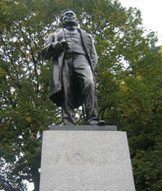 Mmmm … a nice cheque just in time for Christmas 2010. And then another cheque in June 2011 – just three months before what is almost certainly going to be the next Ontario election on October 6, 2011. Here is no doubt at least part of what the Toronto Star‘s Jim Coyle means when he suggests that such careful provincial budgeting may or may not work in the very end, but if it does Premier McGuinty “might have written himself a place in Ontario history books.”
Mmmm … a nice cheque just in time for Christmas 2010. And then another cheque in June 2011 – just three months before what is almost certainly going to be the next Ontario election on October 6, 2011. Here is no doubt at least part of what the Toronto Star‘s Jim Coyle means when he suggests that such careful provincial budgeting may or may not work in the very end, but if it does Premier McGuinty “might have written himself a place in Ontario history books.”
And it is not altogether unreasonable for more spiritual students of Ontario history to imagine that somewhere in the sky, directly above his statue on the lawn at Queen’s Park, the great guru of all Liberal premiers of Canada’s most populous province, Oliver Mowat (in office without interruption from 1872 until 1896, and founder of the nefarious “Liquor Licensing Scheme” for later 19th century Ontario taverns) is looking down upon his successors and smiling broadly.
Premier McGuinty may not be to everyone’s taste. Over the next two and a half years, the global economic and financial storm may finally blow his provincial ship of state over Niagara Falls – or onto the vast reaches of rugged rock where the French River meets Georgian Bay. But if you examine his opposition parties at the moment, you might also guess that the premier can probably take some heart from his finance minister’s peroration to Budget Speech 2009: “Each generation of Ontarians has risen to the challenge of its day … I am confident, Mr. Speaker, that our generation will rise to this challenge too … Because I am confident in Ontarians … We have the skills. We have the expertise and we have the drive … We can do this … We’re Ontario.” (And just before the next election we will have a cheque from the premier in our pockets too!)
MARCH 9: MS. HORWATH FROM HAMILTON IS NEW ONTARIO NDP LEADER .. IS GREEN MCGUINTY IN TROUBLE?
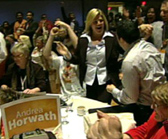 The always interesting and informative Chantal Hebert has just written in the Toronto Star that: “The 2011 Ontario election is lining up to be the toughest campaign fought by an outgoing government at Queen’s Park since Bob Rae ran for re-election in 1995.”
The always interesting and informative Chantal Hebert has just written in the Toronto Star that: “The 2011 Ontario election is lining up to be the toughest campaign fought by an outgoing government at Queen’s Park since Bob Rae ran for re-election in 1995.”
Barring some strange cataclysm, this election is still two-and-a-half years away. Whatever else, it’s very early days yet. Ms. Hebert also makes allowances for the Ontario (Progressive) Conservative party’s stumble this past Thursday, when she urges: “Notwithstanding John Tory’s very personal by-election demise, this is a rare period where the timeline of most official opposition leaders looks more promising than that of most heads of governments.”
The key point is that the current “economic storm has put wind in the sails of opposition parties right across the country.”
Ms. Hebert notes too that provincial New Democrats are profiting from headlines like “Buffett says economy fell off cliff” in both British Columbia and Nova Scotia. So what about Ontario – where the provincial NDP has just elected the youthful Andrea Horwath from Hamilton as its new leader? Or is Premier Dalton McGuinty’s “bold proposal that stakes the province’s economic future on renewable energy” going to save him from the “Rising or falling with the economy” trend that is haunting everyone else?
“She really hasn’t accepted that the Ontario of tomorrow is going to be fundamentally different”?
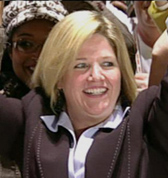 The very bottom line, no doubt, is that only time will give any definitive answers. Meanwhile, if you look hard at both Ms. Horwath and Mr. McGuinty (and the now leaderless Ontario PCs), you might want to keep your money on the current Liberal premier (even if you think he still does look like Norman Bates in the old Alfred Hitchcock movie, Psycho).
The very bottom line, no doubt, is that only time will give any definitive answers. Meanwhile, if you look hard at both Ms. Horwath and Mr. McGuinty (and the now leaderless Ontario PCs), you might want to keep your money on the current Liberal premier (even if you think he still does look like Norman Bates in the old Alfred Hitchcock movie, Psycho).
Andrea Horwath had a convincing enough victory at the Ontario NDP convention this past Saturday. She took just over 60% of the vote on the third ballot, against Peter Tabuns from Toronto, “a former Greenpeace director considered the establishment candidate.” Gilles Bisson from northern Ontario had dropped out on the second ballot with not quite 25% of the vote. Michael Prue, also from Toronto, dropped out on the first ballot with just 11%.
Ms. Horwath is also young (46), and the Ontario NDP’s first woman leader. She comes from an urban riding in the south, where the bulk of the Ontario population resides, after the long reign of Howard Hampton from the north. During her campaign she “stressed her background as a community organizer [just like Barack Obama, sort of?] and argued she has the energy and ideas to rebuild the struggling party.”
And yet … Graham White, the University of Toronto political science professor and editor of an old standard Ontario government and politics textbook, has noted that “Horwath has been able to get people excited and may garner new enthusiasm for the party.” But: “I don’t get a sense from her” about “new leadership, new ideas.” She “has some thoughts on green economy.” As a union brat from the old industrial heartland, however, whose father’s job in the auto sector helped send her to college, a lot of her economic thinking has “seemed to be that she didn’t want to adjust to the de-industrialization of Ontario … She really hasn’t accepted that the Ontario of tomorrow is going to be fundamentally different.”
“If only to keep the Liberals on the straight and narrow against the inevitable coming pressure to tilt to the right”?
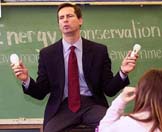 Murray Campbell at the Globe and Mail has somewhat similarly opined about Ms. Horwath: “A new NDP face, yes, but new ideas? Maybe not … The Liberals are already portraying her as an outdated creature with 1970s-era ideology.”
Murray Campbell at the Globe and Mail has somewhat similarly opined about Ms. Horwath: “A new NDP face, yes, but new ideas? Maybe not … The Liberals are already portraying her as an outdated creature with 1970s-era ideology.”
Meanwhile, the Toronto Star has just interviewed Premier McGuinty on his Liberal government’s “bold proposal that stakes the province’s economic future on renewable energy.” The Star quite reasonably asks: “How do you sell this legislation [i.e. the new Bill 150, the Green Energy and Green Economy Act, 2009: see below for further details] to those who say the time isn’t right, that people aren’t ready to pay a higher price for going green, or that building a green economy won’t solve Ontario’s economic woes?”
The Premier answers, shrewdly enough: “We’ll be judged on its record, not on its introduction, not on the media associated with the introduction. It will be the actual Ontario experience at election time… There are a lot of people out there saying it would be nice if they had a Green Energy Act in New Hampshire, and then in Texas and then in BC, and then we could build on that. Well, there’s a price associated with leadership. You’ve got to take a few risks. There are going to be people who doubt at the outset, and that’s understandable and predictable. But our job is to move forward and find a way to enjoy successes with this. Are we going to need to improve the bill in some ways? Probably, because it’s pretty comprehensive.”
 Still, as Murray Campbell has also urged, Premier McGuinty’s “government is hugely vulnerable on social issues as it hunkers down to deal with the economic crisis … Given the continued uncertainty in the Progressive Conservative ranks, Ms. Horwath, with her tiny 10-member caucus, will be the de facto Opposition Leader” for the time being.
Still, as Murray Campbell has also urged, Premier McGuinty’s “government is hugely vulnerable on social issues as it hunkers down to deal with the economic crisis … Given the continued uncertainty in the Progressive Conservative ranks, Ms. Horwath, with her tiny 10-member caucus, will be the de facto Opposition Leader” for the time being.
If it seems unlikely at this juncture that she will ever become premier herself, the retiring Ontario NDP leader Howard Hampton “as he stepped down … held out” another perhaps more customary “perennial NDP dream – the balance of power. Given the economic turbulence ahead, he said, you could easily see a minority government 2 1/2 years from now.'”
And then Ryan McGreal, in the interesting blog from Ms. Horwath’s Hamilton hometown, Raise the Hammer, perhaps most astutely pointed out: “It seems that parties all across the spectrum have recently embraced the very Keynesian counter-cyclical stimulus spending for which [former Ontario NDP Premier and now federal Liberal Bob] Rae was so bitterly castigated [back in the early 1990s] … it seems we’re all suddenly social democrats [now] … With the provincial Conservatives in disarray, it may be time for the NDP to show its stuff … even if only to keep the Liberals on the straight and narrow against the inevitable coming pressure to tilt to the right.”
MARCH 2: ONTARIO IN THE HARD NEW ERA
 [UPDATED THURSDAY, MARCH 5]. The Montreal-based Association for Canadian Studies has sponsored a new opinion poll that confirms a point long familiar to students of provincial government and politics. “Ontario residents are significantly more likely” than residents of other provinces “to define themselves exclusively as Canadian,’ and more inclined to downplay their provincial identity.”
[UPDATED THURSDAY, MARCH 5]. The Montreal-based Association for Canadian Studies has sponsored a new opinion poll that confirms a point long familiar to students of provincial government and politics. “Ontario residents are significantly more likely” than residents of other provinces “to define themselves exclusively as Canadian,’ and more inclined to downplay their provincial identity.”
Yet in the new “prolonged economic siege” that “Canadian executives are digging in for” Ontario is facing unique hard times. (See the regional auto sector, e.g..) And, in the nature of the federal Constitution, it is the provincial political system that must struggle hardest to adapt.
So the government of Liberal Premier Dalton McGuinty has just introduced a so-called “green energy bill … in hopes of creating 50,000 new jobs.” This coming Thursday, March 5, the aptly named Progressive Conservative opposition leader, John Tory, will (hopefully) at last win a seat in the Legislative Assembly at Queen’s Park – and take proper command of his party in the hard times ahead. [Alas, as of 11:45 PM, March 5, it did not happen: See “Tory defeated in by-election” and “John Tory loses bid for seat in byelection.” Mr. Tory`s political career has almost certainly come to an end – which is at least good news for Premier McGuinty.]
On Saturday, March 7, Ontario New Democrats will choose a new leader for their party. (PRELIMINARY UPDATE MARCH 7: Andrea Horwath has now won, and become the first woman leader of the Ontario NDP.) On Thursday, March 26 a new Ontario budget will finally see the light of day, with a possible $10 billion deficit (or even more!). Regardless of all the noise about Canada first, somebody ought to be paying some kind of fresh attention to Ontario government and politics these days.
Growing the new green economy in Canada’s most populous province …
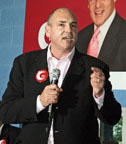 The “green economy” is the latest economic development buzz concept – at least in such circles as those inhabited by the Ontario Liberal Party. Among other things, it underpins much progressive thinking of the prestigious (and justifiably so) Obama administration down south.
The “green economy” is the latest economic development buzz concept – at least in such circles as those inhabited by the Ontario Liberal Party. Among other things, it underpins much progressive thinking of the prestigious (and justifiably so) Obama administration down south.
A somewhat rough critic might say that, more broadly, it is what “high technology” was a generation ago – an alleged universal panacea for current economic problems. I.e., what is the single most constructive answer to all the “slower growth,” “dire times,” “rough ride[s],” and “years of deficits” that “gloomy McGuinty” has been fretting about lately in newspaper headlines? In a word (or at least four of them) – build the green economy, in the midst of the fading “auto-industrial society,” as particularly incarnated north of the Great Lakes.
Who knows just how successful all this will finally prove to be – as a means of dealing with either current economic or environmental challenges? But it does suggest one way of summarizing certain potentially constructive new directions, in a world that increasingly needs something beyond the only vaguely updated 19th century free market policy thinking, that has dominated the English-speaking universe since the early 1980s (when Ronald Reagan in the United States joined Margaret Thatcher in the United Kingdom).
Meanwhile, in Ontario the Hon. George Smitherman, Minister of Energy and Infrastructure, moved a First Reading of Bill 150, the Green Energy and Green Economy Act, 2009 on Monday, February 23. And this was followed by three days of Second Reading debate in the Legislative Assembly. The bill is broadly described as “An Act to enact the Green Energy Act, 2009 and to build a green economy, to repeal the Energy Conservation Leadership Act, 2006 and the Energy Efficiency Act and to amend other statutes.”
 Particularly if you are suffering from severe insomnia, you can read through Bill 150 in its entirety by CLICKING HERE! The Green Energy Act, 2009 – the main fresh ingredient in Bill 150 – is divided into six parts: PART I : INTERPRETATION AND GENERAL APPLICATION ; PART II : DESIGNATED GOODS, SERVICES AND TECHNOLOGIES AND RENEWABLE ENERGY PROJECTS AND ENERGY CONSERVATION IN THE PUBLIC SECTOR ; PART III : ENERGY EFFICIENCY AND EFFICIENT USE OF WATER ; PART IV : INSPECTIONS, ENFORCEMENT AND PENALTIES ; PART V : REGULATIONS ; PART VI : REPEALS, COMMENCEMENT AND SHORT TITLE.
Particularly if you are suffering from severe insomnia, you can read through Bill 150 in its entirety by CLICKING HERE! The Green Energy Act, 2009 – the main fresh ingredient in Bill 150 – is divided into six parts: PART I : INTERPRETATION AND GENERAL APPLICATION ; PART II : DESIGNATED GOODS, SERVICES AND TECHNOLOGIES AND RENEWABLE ENERGY PROJECTS AND ENERGY CONSERVATION IN THE PUBLIC SECTOR ; PART III : ENERGY EFFICIENCY AND EFFICIENT USE OF WATER ; PART IV : INSPECTIONS, ENFORCEMENT AND PENALTIES ; PART V : REGULATIONS ; PART VI : REPEALS, COMMENCEMENT AND SHORT TITLE.
One thing that has slowed down virtually all environmental policy development over the past generation is the prospect that its effective implementation depends too much on new statist repressions of the free and democratic citizenry (in the interests of new sciences that are still very far from exact). There is also one thing of this sort about the Ontario Green Energy Act, 2009 that both the conservative National Post and the liberal Toronto Star apparently agree on right off the bat. As the Post has complained: “For homeowners already facing one of the worst markets in decades, the new law will mean they will be forced to pay for an energy audit before putting their house on the market.”
The Star has similarly editorialized: “The Liberal government at Queen’s Park is running into flak over a section of the Green Energy Act that would require energy audits to be conducted before every home sale. The cost of such an audit is about $300. The government is proposing to rebate half that amount, with homeowners picking up the balance … If, as Energy Minister George Smitherman says, buyers would benefit from this information, surely they can arrange for the audits without being told to do so by the government, just as many of them now pay for pre-sale home inspections to make sure the roof isn’t leaking … Smitherman has already begun backtracking on the idea. This is something we can fine-tune,’ he said the day after the energy act was tabled. He can start the fine-tuning by leaving the energy audits up to the option of the buyers, with the government rebate as an incentive.”
This is just a taste of various contentious enough issues at stake, for the day to day lives of the practically sovereign people in Canada’s most populous province. Even for those Ontario residents who very rigorously see themselves as Canadians first, the ongoing provincial debate over Bill 150, the Green Energy and Green Economy Act, 2009, will continue to be worth following with more attention than usual.
Can John Tory do it … or do what? (apparently NOT!) …
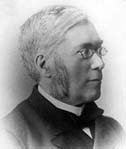 Premier Dalton McGuinty may be boring – or even actively annoying to some Ontario residents who are not necessarily staunch supporters of one or the other of the opposition parties in the Legislative Assembly at Queen’s Park.
Premier Dalton McGuinty may be boring – or even actively annoying to some Ontario residents who are not necessarily staunch supporters of one or the other of the opposition parties in the Legislative Assembly at Queen’s Park.
But similar things could be and have been said about the province’s founding giant of the late 19th century, Oliver Mowat – whose Liberal “Great Reform” government remained in office for 24 consecutive years. (And that was just under Mowat himself. It hung around for another nine years after he left office.)
McGuinty has now won two consecutive Liberal majority governments. There are moments when he does seem to resemble Oliver Mowat (a man who “wore the white flower of a blameless life,” but also a crafty political operator who believed in the virtues of hypocrisy and liked to call himself “the Christian Statesman” – a term viewed with scepticism by his opponents). Insofar as this makes some vague sense, it could be argued as well that Premier McGuinty’s current Conservative opponent, John Tory, somewhat resembles one of Oliver Mowat’s now long forgotten Conservative opponents from the late 19th century, William Ralph Meredith.
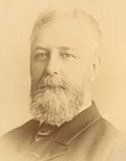 Not unlike John Tory today, Meredith was (to quote the political historian of late 19th century Ontario W.S. Wallace) a man of “high character … fine presence, and … very considerable ability.” He “attacked vigorously what he described as the extravagance of the government.”
Not unlike John Tory today, Meredith was (to quote the political historian of late 19th century Ontario W.S. Wallace) a man of “high character … fine presence, and … very considerable ability.” He “attacked vigorously what he described as the extravagance of the government.”
At the same time, under Meredith’s leadership the “conservative party” in Ontario “took on something of the aspect of that tory democracy which, under Disraeli and Lord Randolph Churchill, had arisen across the sea.” At one point in his career as well, Meredith tried (unsuccessfully) to win the province’s “Catholic vote” away from the Mowat Liberals – in a piece of failed strategy slightly reminiscent of John Tory’s unhappy scheme to extend Catholic separate school funding to other religious groups, in the most recent Ontario election.
William Ralph Meredith led the Ontario Conservatives from 1879 to 1894, without ever managing to win a provincial election. As W.S. Wallace noted in the early 20th century: “His continued exclusion from office is a little difficult to explain.” He was without doubt a worthy opponent to Oliver Mowat, the often annoying but long-lived self-proclaimed Christian Statesman. Yet, despite Meredith’s very considerable ability, he never managed to beat Mowat.
 This may not prove all that apt a precedent for the John Tory of today, who “is hoping to re-join his caucus by winning a seat in a March 5 by-election in the central Ontario riding of Haliburton-Kawartha Lakes-Brock.” (And Dalton McGuinty may not really be the Oliver Mowat of the early 21st century either!) But there are moments when the folkloric wisdom that those who do not know their own history are condemned to repeat it does seem vaguely appropriate to contemporary Ontario politics.
This may not prove all that apt a precedent for the John Tory of today, who “is hoping to re-join his caucus by winning a seat in a March 5 by-election in the central Ontario riding of Haliburton-Kawartha Lakes-Brock.” (And Dalton McGuinty may not really be the Oliver Mowat of the early 21st century either!) But there are moments when the folkloric wisdom that those who do not know their own history are condemned to repeat it does seem vaguely appropriate to contemporary Ontario politics.
Meanwhile, the immediate question is: Can John Tory actually win Haliburton-Kawartha Lakes-Brock in the by-election on March 5? There are some signs that it may not exactly be a cakewalk. (And at least William Ralph Meredith did manage to win his seat in the legislature.)
UPDATE 11:45 PM, MARCH 5: As noted above Mr. Tory has not managed to win Haliburton-Kawartha Lakes-Brock. His Liberal opponent beat him, rather narrowly but clearly enough.
It seems that there was considerable resentment over Mr. Tory`s non-local status. (He is a very urban and even urbane Torontonian, and Haliburton-Kawartha Lakes-Brock is a quite rural riding, with only a strong cottage country overlay at best.)The Liberals played up their candidate`s local status in what was a quite aggressive campaign for a by-election of this sort. Premier McGuinty may be an old Ontario gentleman of sorts, but he also plays politics hard. And there was no noblesse oblige for the official opposition leader here. The current economic hard times may have played some role as well. In any case, the McGuinty Liberals should be pleased. They have destroyed the career of the current official opposition leader, in the midst if also partly because of economic hard times. For further commentary see “Ontario PC leader Tory trails in byelection” and “Today’s by-election tests Tory and McGuinty.”
The Ontario New Democrats … a protest movement becalmed again?
 Carrying on with the theme that those who do not know their own history are condemned to repeat it, back in 1964 the University of Toronto sociologist Leo Zakuta published a book called A protest movement becalmed … a study of change in the C.C.F. (where “CCF” stands for Co-operative Commonwealth Federation – the name of the precursor of today’s New Democratic Party, in Ontario and across Canada alike).
Carrying on with the theme that those who do not know their own history are condemned to repeat it, back in 1964 the University of Toronto sociologist Leo Zakuta published a book called A protest movement becalmed … a study of change in the C.C.F. (where “CCF” stands for Co-operative Commonwealth Federation – the name of the precursor of today’s New Democratic Party, in Ontario and across Canada alike).
Looking towards the imminent Ontario New Democratic Party leadership convention this coming March 7, it is tempting to jump to the conclusion that the movement is becalmed yet again, in Canada’s most populous province at any rate? (The situation does look more promising, e.g., in Nova Scotia.)
The worst thing that ever happened to the Ontario NDP, it sometimes seems, was when it won the 1990 provincial election – much to the surprise of everyone, especially including itself. In the end it showed that it was still not ready to govern. It was happiest as a protest movement. Ever since it’s been on a downhill ride. Nowadays it is not even protesting most of the time. It is just defending the established interests of public and sometimes private sector unions, northern Ontario, a few Toronto and Hamilton ridings, and so forth, on and on …
The retiring Howard Hampton from northern Ontario has at least held the party together in difficult times. It may too often seem too much of a tired old social democratic machine, most concerned about its own organizational survival.
 But it nonetheless has survived – as some kind of professionally organized representative of the furthest left on the regional political spectrum. And that does seem enough for many of the party’s continuing supporters in Ontario politics.
But it nonetheless has survived – as some kind of professionally organized representative of the furthest left on the regional political spectrum. And that does seem enough for many of the party’s continuing supporters in Ontario politics.
As summarized by the Toronto Star, the lacklustre race to succeed Howard Hampton, which concludes on Saturday, March 7, 2009 is “among four sitting MPPs [or Members of Provincial Parliament, as the local jargon still has it] – Gilles Bisson [from northern Ontario], Andrea Horwath [from Hamilton], Michael Prue [from Toronto] and Peter Tabuns [also from Toronto]” (all pictured in the same order, from right to left, in the photo here).
The Star goes on: “All are veteran politicians. All are decent and thoughtful people. None could be described as inspiring … Of the four, Horwath would be our choice. While during the campaign she has stuck rigidly to past NDP platform positions, she represents change in other ways – generation (at 45, she is the youngest of the four candidates), geography (she is from Hamilton) and gender (the provincial NDP has never had a woman leader). And there is hope she would grow in office.”
This seems to me as plausible an assessment of the race as is likely to be found at this juncture. The other three candidates have their advocates. But the debates among all four have made few headlines. This is largely because they have been saying little of real consequence about the challenges of the Ontario future. And when you consider just how big these challenges increasingly appear to be, that is unfortunate for both the party and the province at large. (PRELIMINARY UPDATE: Again, as noted above, Ontario New Democrats have now taken the Toronto Star‘s advice, and chosen Ms. Horwath as their new leader.)
Waiting for a “transformational” Ontario Budget 2009?
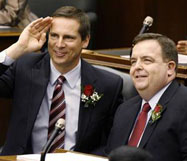 Back on February 18, the Globe and Mail‘s resident Man at Queen’s Park, Murray Campbell, was reporting that “The federal government tabled its recession-fighting budget three weeks ago, while yesterday President Barack Obama signed into law a $787-billion stimulus package designed to turn around the U.S. economy … Things move more slowly in Ontario, where the outline of a plan to deal with the crippling economic crisis won’t come until the spring thaw … Finance Minister Dwight Duncan confirmed yesterday that he won’t be bringing down a budget until the end of March, which is about five weeks later than he once thought would be possible.”
Back on February 18, the Globe and Mail‘s resident Man at Queen’s Park, Murray Campbell, was reporting that “The federal government tabled its recession-fighting budget three weeks ago, while yesterday President Barack Obama signed into law a $787-billion stimulus package designed to turn around the U.S. economy … Things move more slowly in Ontario, where the outline of a plan to deal with the crippling economic crisis won’t come until the spring thaw … Finance Minister Dwight Duncan confirmed yesterday that he won’t be bringing down a budget until the end of March, which is about five weeks later than he once thought would be possible.”
Initially, the finance minister “had completed his prebudget consultations before Christmas in order to get the document out early.” More recently: “The minister said he had to postpone to deal with the impact of the rescue package of the Detroit Three auto makers and to get details about how Ottawa intends to disburse its $12-billion infrastructure plan.” As Murray Campbell has explained: “Premier Dalton McGuinty offered a similar explanation. Urgent is important [but] getting it right is also important … There are so many pieces that remain in motion with respect to the global economy that for us to take a few more days to understand the world that we’re going into is the right thing to do’.”
According to Robert Benzie, Queen’s Park Bureau Chief at the Toronto Star, on February 19: “Ontario Finance Minister Dwight Duncan will table a recession-fighting provincial budget awash in red ink on March 26 … The treasurer [i.e. finance minister], who has been under fire for delaying the spending plan’s release by a month from an original target of late February, emphasized that the timing is not unusual … It’s actually one of the earliest dates ever. So it’s not late at all,’ he said.” (And that is certainly true, historically.)
Mr. Benzie went on: “The budget is expected to eclipse the $100 billion mark for the first time ever with a deficit of as much as $10 billion. In contrast, last year’s budget was a $96.3 billion spending plan with a $500 million shortfall … While Premier Dalton McGuinty has admitted there will be a significant deficit,’ Duncan refused to discuss any details.”
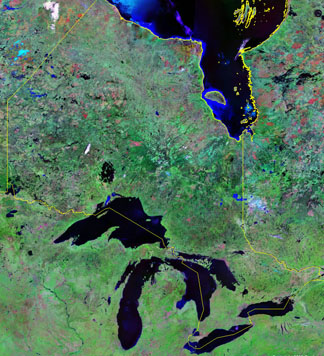 On February 26 the Star published a fresh report from the Canadian Press: “There are new predictions that Ontario’s deficit could climb as high as $18 billion over two years, leading a tide of red ink that’s expected to wash over Canada as the provinces hunker down for a recession … TD [Bank] chief economist Don Drummond said … he’s expecting Ontario to run a deficit of about $5 billion in the current fiscal year ending March 31 and another $13 billion in the next … Previous estimates had pegged the province’s deficit between $5 billion and $10 billion, taking into account … promises to bail out struggling automakers and match federal dollars for infrastructure projects meant to kickstart the ailing economy.”
On February 26 the Star published a fresh report from the Canadian Press: “There are new predictions that Ontario’s deficit could climb as high as $18 billion over two years, leading a tide of red ink that’s expected to wash over Canada as the provinces hunker down for a recession … TD [Bank] chief economist Don Drummond said … he’s expecting Ontario to run a deficit of about $5 billion in the current fiscal year ending March 31 and another $13 billion in the next … Previous estimates had pegged the province’s deficit between $5 billion and $10 billion, taking into account … promises to bail out struggling automakers and match federal dollars for infrastructure projects meant to kickstart the ailing economy.”
On Saturday, February 28 the Toronto Star published an editorial called “Opportunity in Ontario budget.” It began: “Grabbing headlines this week was a forecast from TD Bank chief economist Don Drummond of a $13 billion provincial deficit, thanks to the free fall’ of the American economy. [It is never us or our economy in Canada that is to blame for anything, of course.] … It was noted that a deficit that size would be even larger than the record $12.4 billion registered by Bob Rae’s much-maligned NDP government in the 1992-3 fiscal year. (Albeit, the Rae deficit was still proportionately larger, as the provincial budget was half as big in those days.)”
The Star editorial went on: “The deficit forecast contributed to the crisis-like atmosphere at Queen’s Park as the provincial government prepares to bring down its budget on March 26 with its revenues falling amid demands for more spending … These are some of the toughest times we’ve ever seen in Ontario,’ concedes a sombre Premier Dalton McGuinty. The global economic crisis that has our province in its grip is deeply affecting us.’ … But the crisis also presents the government with an opportunity to make this a transformational budget – one that will provide lasting benefits beyond the current economic tsunami.”
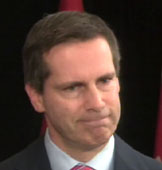 “Transformation,” of course, is not exactly the usual Ontario style – of either Dalton McGuinty or the great late 19th century provincial Liberal guru Oliver Mowat . As Mowat’s modern biographer, Margaret Evans, has explained, he set in motion the “traditions of strict public morality, competent, businesslike administration, and cautiously progressive social and economic policies in substantial harmony with the ideals of the people,” that have continued to guide the most successful Ontario governments.
“Transformation,” of course, is not exactly the usual Ontario style – of either Dalton McGuinty or the great late 19th century provincial Liberal guru Oliver Mowat . As Mowat’s modern biographer, Margaret Evans, has explained, he set in motion the “traditions of strict public morality, competent, businesslike administration, and cautiously progressive social and economic policies in substantial harmony with the ideals of the people,” that have continued to guide the most successful Ontario governments.
On the other hand, things are changing in Ontario, and even Oliver Mowat might agree that no particular political formula works forever. Bill 150, the Green Energy and Green Economy Act, 2009, is already something of a transformational document. And it may signal broader things to come in the March 26 budget.
Moreover, Ontario does have a long and honourable history as a copycat place – especially if what is being copied originates in the United States or the United Kingdom. Both Bill 150 and the concept of a transformational budget are just copies of what Barack Obama is doing (or at least trying to do?) in the adjacent United States. So, you might say, why not? (And/or on a day when stock markets have shown some precipitous decline, throughout the global village, what, you might also say, does anyone have to lose?)
POSTSCRIPT: Ontario’s changing role in confederation (a preface to thoughts for another day) …
If Ontario’s 2009 budget really is going to be “transformational” – in some degree at least – you might ask as well: why stop there?
Ontario, e.g., has often been said to have some unique role in the Canadian confederation that began in 1867 – by virtue of its unusually large share of the Canadian population, and its somewhat central geographic location, between Quebec and Atlantic Canada on the one hand, and Western Canada on the other. And this traditional role could arguably do with some transforming nowadays too – along with the regional political economy, and so forth.
|
Province |
Pop 1 Jul 06 |
% Canada |
Pop 1 Oct 08 |
% Canada |
|
Ontario |
12,665,346 |
38.8793 |
12,977,059 |
38.8055 |
|
Quebec |
7,631,552 |
23.4269 |
7,771,854 |
23.2403 |
|
British Columbia |
4,243,580 |
13.0267 |
4,405,534 |
13.1739 |
|
Alberta |
3,421,253 |
10.5023 |
3,610,782 |
10.7974 |
|
TOTAL |
27,961,731 |
85.8352 |
28,765,229 |
86.0171 |
|
CANADA |
32,576,074 |
100.0000 |
33,441,277 |
100.0000 |
|
SOURCE: Statistics Canada |
||||
 My notes here are already far too long. Almost all further thoughts of this sort must wait for another day. To give just a few hints, however, Premier McGuinty is already on record as not exactly an opponent of the Senate reform that has figured prominently enough in recent Western Canadian designs for the future of the confederation, but as at least someone who is profoundly agnostic on the subject – and who believes that Ontario is not at all interested, at best.
My notes here are already far too long. Almost all further thoughts of this sort must wait for another day. To give just a few hints, however, Premier McGuinty is already on record as not exactly an opponent of the Senate reform that has figured prominently enough in recent Western Canadian designs for the future of the confederation, but as at least someone who is profoundly agnostic on the subject – and who believes that Ontario is not at all interested, at best.
Yet if Dalton McGuinty’s Ontario government finally does bring down some kind of transformational budget this coming March 26, who knows just what the future beyond that might bring? Maybe there actually will be room for an Ontario approach to Senate reform, that works for the two most populous provinces of the confederation, in Ontario and Quebec, at the same time that it protects the regional interests of Western, Atlantic, and Northern Canada too?
Even in Ontario nowadays (and even in the mind of the Ontario premier, it has seemed lately?) the times are a-changin,’ perhaps as never before. Almost anything could be possible. And an Ontario that took any version of Senate reform seriously certainly would signal a fresh and constructive approach to what the 1960s premier John Robarts called the Confederation of Tomorrow.
Here as elsewhere, at any rate, there is opportunity as well as challenge in Premier McGuinty`s “global economic crisis that has our province in its grip.” Ontario has long thought of itself as the “province of opportunity.” One way or another, it would be a mistake to imagine that this is going to suddenly end – no matter how much “Ontario residents are significantly more likely” than residents of other provinces “to define themselves exclusively as Canadian,’ and more inclined to downplay their provincial identity.”
Randall White is the author of a number of books, including Ontario 1610-1985: A Political and Economic History, and Ontario Since 1985.

